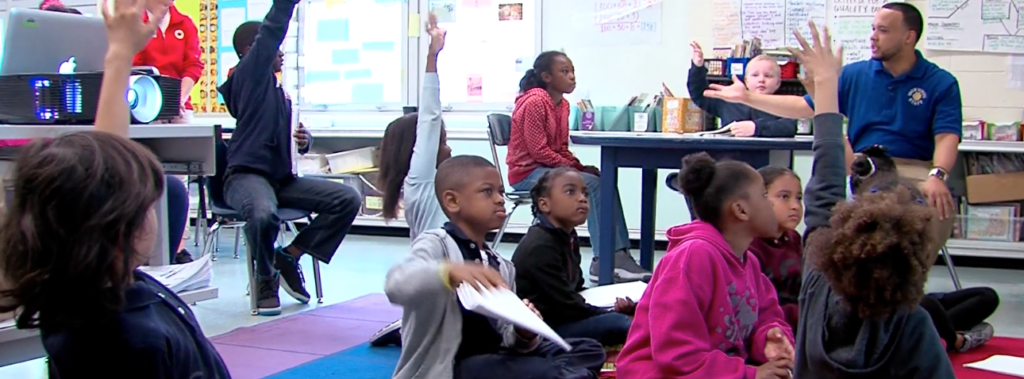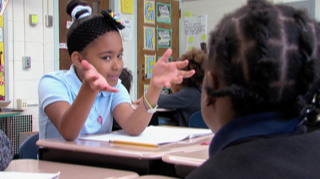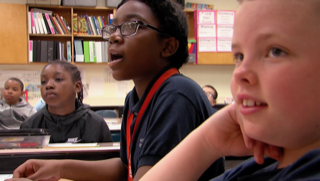The Power of Teacher Reflection to Sustain Equitable Math Learning Communities
by Lynne Godfrey
November 15, 2023

Reflection? Who has time for reflection? I’m learning a new curriculum! My students have missed a year+ of school! We’re exhausted. I’m doing the best I can. These are the laments we have heard from teachers as they returned to their classrooms to begin another school year.
All valid. All too real. And yet, despite these challenges, teachers remain committed to doing their best for all of their students and are especially concerned about the students in front of them who have been historically marginalized and may not see the math classroom as theirs. Many teachers and districts are (re)-committing to equity goals, and they are all too aware that the aspects of equitable teaching and learning require “more substantive and sustained changes to mindset and belief over time.” (Boston Public Schools, 2023.)
For example, Minnesota expects school leaders to “ensure culturally responsive practices are embedded into the curriculum and instructional process” and professional development, and that educators “develop increasing consciousness of the ways in which learning, experiences and consciousness of racial and cultural identities impact and influence planning, curricula and delivery of instruction.” (The Minnesota Every Student Succeeds Act Equity Leadership Learning Community, 2023.)
Although many districts have clearly stated goals and priorities, the resources and tools that school leaders and teachers need to achieve these goals aren’t always readily available. The what has been identified, but the how is not apparent. Educators might ask, “How do I develop increasing consciousness of the ways in which learning, experiences and consciousness can impact my planning, what I teach and how I teach?” and coaches might ask, “How do I ensure culturally responsive practices are embedded into the curriculum and instructional process?”
As noted in Using Teacher Self Reflection to Foster Equitable Learning Communities, self-reflection can be a powerful tool for teachers and school leaders. It can be implemented immediately and regularly to help us focus on instructional practices, uncover beliefs and values that may impact how our students see themselves in the math classroom, and move us to take action to create more inclusive learning communities. Given the challenges stated above, our equity goals can be more integrated into our daily practice if done in collaboration with colleagues, students, and coaches. We don’t have to wait for a “directive” or a designated day of the school year to get started.

Getting Started: Collecting and Reflecting on the Data
There is no one place to begin. The important thing is to decide on a question related to equity and consider how and when to collect that data. Enlisting the help of a colleague, students, a coach, or use of a video recorder can make data collection more manageable.
Adding one or two questions to our toolbox can be an efficient and accessible way to collect and reflect on our role in students’ participation and can easily be incorporated into collaborative data collection. For example:
- Who did/didn’t I call on during the whole group discussion?
- Whose ideas, questions, strategies did I chart?
- What patterns do I see? Are there children from marginalized groups whose voices were not heard in whole group, small group, or partner share? Consider race, socio economic status, gender identification, neurological diversity, identified (dis)ability, multilingualism, playground or street cred otherwise known as community status.
- How can I better prepare and position students to be contributing members of the math community?
Taking Action on the Data We Collect
As patterns emerge in who contributes to the math discourse, we can begin to make decisions about who to call on, what work or strategies to share, how to pair or group students for learning and how to center the thinking and ideas of all students, especially those who have historically been underserved in the math classroom. See Using Teacher Self Reflection to Foster Equitable Learning Communities for the decisions one teacher made when she discovered an imbalance in who was and wasn’t sharing during math discussions.
The data we reflect on and the questions we ask can also be inspired by the feedback we get from students.
When I taught sixth grade at a small school in a major city that served majority Black and Latinx youth, Patrick, one of three white children in my class, told me I didn’t call on him because he was white. I heard his feedback and decided to collect some data. Who was I calling on? What kinds of questions did I ask which students? And who volunteered to contribute, but was not called on? The assistant teacher, Roberta, agreed to collect data on these questions over the course of a month. The students graphed the data and presented their findings to me. As it turned out, Patrick, who raised the original concern, was called on an equal number of times as any other student. This satisfied Patrick’s query. However, the data revealed that I called on boys more frequently than girls. Why? Was I only paying attention to the loudest and most confident voices? Did I hold an unconscious belief in ability based on gender? Cause for self-reflection! How could this be happening? I had three daughters of my own! The students and I discussed the findings and they gave helpful suggestions for making sure all voices were being heard. One of the suggestions was for me to wait longer before calling on a student. Patrick’s conjecture—one student’s reflection and inquiry—made a way for all of us to pause and take stock of whose voices were/were not being heard and valued.
This story illustrates how students can be a resource for helping us investigate and strengthen equitable classroom practices. See What Do Your Students Think About Math? Student Reflection as a Tool for Finding Out for more on gathering students’ feedback about their experience in the math classroom.
Self-Reflection: A Continuous Cycle

Enacting curriculum that centers student thinking, thoughtfully and with integrity, is essential to creating productive learning communities. Making use of formative assessment data and providing timely, forward-moving feedback is also critical. And yet, these practices are not enough to create and sustain equitable learning communities. We as teachers are better prepared to orchestrate communities where all students contribute and see themselves as doers of mathematics when we and our colleagues, administrators, and coaches are supported to prioritize time to reflect on what is happening in our classrooms.
The challenges—time, new curriculum, interrupted or lost time for learning, among others—are real. At the same time our students need us to stay focused on them, doing our best to keep who they are and what they need to thrive, at the center. Partnering with colleagues, administrators, and students can reinforce and strengthen our commitment to keeping equitable learning communities at the forefront. Dedicated time and space for teachers to pause, collect data, reflect, take action, and repeat is a necessary cycle in supporting teachers to progress toward the goal of equitable learning communities.
Note: This blog is the second in a series about teacher reflection. Read the first here. The third focuses on teachers’ experiences with a tool designed to support reflection on whole class discussions.
References
Boston Public Schools. (2023). The Interactive Rubric of Effective Teaching: Reflective and Collaborative Elements. Retrieved from: https://www.bostonpublicschools.org/Page/6887
Garcia, Marta & Sussman, Annie (2023, October 11). What Do Your Students Think about Math? Student Reflection as a Tool for Finding Out. Math Equity Forum Blog.
Godfrey, Lynne (2023, November 8). Using Teacher Self Reflection to Foster Equitable Learning Communities. Math Equity Forum Blog.
The Minnesota Every Student Succeeds Act Equity Leadership Learning Community. (2023). Minnesota Equity in Action Framework. Retrieved from: https://education.mn.gov/MDE/dse/edi/equityact/

